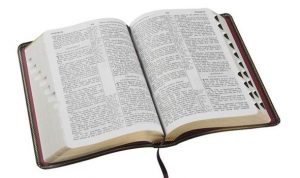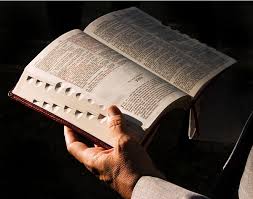April 2018
Dear [first name],
 This morning in our family reading we read from the first chapter of Colossians:
This morning in our family reading we read from the first chapter of Colossians:
April 2018
Dear [first name],
 This morning in our family reading we read from the first chapter of Colossians:
This morning in our family reading we read from the first chapter of Colossians:

Dublin – January 1878
To Mr P
…
You see the difference there is between the epistles to the Romans, to the Ephesians, and to the Colossians. In the epistle to the Romans, man is considered as living in sin, then we are dead to sin. It is deliverance from the old man in this epistle; one is not raised with Him. In Ephesians, we are raised with Him and seated in heavenly places in Him; we are considered as dead in our sins, and all is God’s creation. In Colossians, we find the two things: “dead with Him”, the way to be delivered, “raised with him” but not seated in heavenly places. Here, man must live in the resurrection Man on earth, having his affections on things which are above where the Christ is. The inheritance is above. In Ephesians, the inheritance is all that Christ has created. Thus, we have three different aspects of the Christian life, with very instructive teachings for our walk. At the beginning of the second [epistle] to the Corinthians, we find the realisation of the epistle to the Romans: “Always bearing about in our body the dying of Jesus, that the life also of Jesus may be manifest in our body”[10]. Then God helps us in it through the circumstances by which he makes us pass. Only, in chapter 5, we have the principle of the epistle to the Ephesians: if one has died for all, then all were dead, and we find there the new creation[11]. If we grasp the significance of these truths, we understand much better what is the true character of Christianity, and its importance also. All this has been a great deal to me. The Word is adapted to our position and our circumstances down here, but it comes from above, and it brings us above. We can take it as divine light for down here or we can indeed follow it and rise up to its source. It is thus with Christ, the living Word, perfectly adapted to poor human beings. It reveals what is in heaven. For our thoughts and our prayers can take the character of one or the other, but all spiritual affections are developed when we are with Him above. Certainly, God draws the brethren to more devotion and spirituality. The Lord is also awaited more really, I believe.
….
Letter originally written in French, translated by Sosthenes, 2013
Click here for original – If you have any comments on the translation, feel free to let me know.
We need to understand two aspects of man’s state of sin
Man as living in evil ways, alive to sin and lust. According to Romans, death must come in to free him from the evil – redemption by grace.
Man as dead towards God. Ephesians treats man as dead in sins and gives us new creation.
 Background in Galatians, Ephesians and Colossians
Background in Galatians, Ephesians and ColossiansIt may facilitate our apprehension of the epistle to the Romans, if we briefly survey Galatians, Ephesians and Colossians.
We need to understand two aspects of man’s state of sin
Galatians brings out the following points: –
The law had been the school-master until Christ came. Now, as sons by faith, having the Spirit, we are consciously heirs – not servants but sons. The flesh, our evil nature, may lust against the Spirit, but, we are not under law. There can be no law against the fruit of the Spirit – elementary, though most important teaching.
Ephesians begins with the counsels of God:
Eph. 2 gives Christ’s work. God’s power comes in and raises us up into His place of glory and blessing. We are sons and heirs. The church, Christ’s body is united to Him, something hidden from all ages and generations, impossible to exist or be revealed till the middle wall of partition had been broken down.
The gifts of the Spirit from the Man on high builds up the saints, forms the body in union with Christ, and evangelises the world. From Eph. 4:17 onward we have practical conduct. Having been brought to God in Christ, we are to display God’s own character, Christ being the perfect pattern in man. Having put off the old man and put on the new, we love one another as Christ loves His church. Finally we are God’s warriors in Canaan – that is, in heavenly places – and have need of God’s whole armour against spiritual wickedness, walking in dependence on God.
In Colossians saints are not sitting in heavenly places, but with a hope laid up for them in heaven. Their are affections are to be set on things above, where Christ sits. They are buried with Him by baptism unto death (as Rom. 6). The believer is looked at as previously alive in his sins, but now quickened with Christ (Col. 2:13). Colossians does not reach on to the full level of Ephesian doctrine, but we do not get these thoughts in Romans at all.
The fullness of the Godhead is in Christ in Colossians; in Ephesians it is the body that is His fullness. The glory of an exalted Christ is before the Christian’s eyes – the glory of God in the face of Jesus Christ.
This should enable us to study the epistle to the Romans more intelligently. Romans does not develop the counsels of God, but lays the ground for their accomplishment. All have sinned, Jew and Gentile, and have the same fleshly nature. There is no difference: God’s righteousness is applicable to both. Sins are put away, and we have deliverance from the old man. Romans treats the responsibility of man, explains God’s righteousness, and unfolds His grace unfolded as the source and principle of God’s dealings with us.
The epistle to the Romans furnishes the eternal principles of God’s relationship with man – the way in which, by means of Christ’s death and resurrection, the believer is established in blessing. It reconciles of these things with the promises made to the Jews, by Him whose gifts and calling are without repentance.
A simplified summary of part of the introduction to John Nelson Darby’s Exposition of the Epistle to the Romans
We get the double headship of Christ over creation and the body, along with His divine glory, in three particulars:
He is the image of the invisible God
All things consist by Him
All the fulness is pleased to dwell in Him
 The Colossians seemed not to have held the Head very fast. Paul therefore brings out the Head’s personal glory, the Christian’s hope being in heaven. The saints are not seen sitting there yet. The life of the new man is brought out especially. Where we have much of the Spirit in Ephesians, He is only mentioned once in Colossians, ‘your love in the Spirit.’ (Ch.1:8)
The Colossians seemed not to have held the Head very fast. Paul therefore brings out the Head’s personal glory, the Christian’s hope being in heaven. The saints are not seen sitting there yet. The life of the new man is brought out especially. Where we have much of the Spirit in Ephesians, He is only mentioned once in Colossians, ‘your love in the Spirit.’ (Ch.1:8)
We get the apostle’s prayer for them: to walk worthy of the Lord Himself and according to His power. Now they are viewed as meet for the inheritance of the saints in light. We get the double headship of Christ over creation and the body, along with His divine glory. In -particular:-
You then get the double reconciliation: the saints reconciled already and of the creation in a day to come. You also get the double ministry of Paul: the gospel to every creature under heaven, and the gospel to the church. The hitherto hidden mystery is made good among the Gentiles by Christ, the hope of glory, dwelling in them.
In chapter 2 the Colossians are warned against philosophy and the spirit of ordinances, separating them from the Head. All the fullness of the godhead dwells in Him, and the saints are complete in Him. Hostile powers are overcome by Him: they (believers) are dead and risen, so as not to be subject to fleshly ordinances. Their liberty is founded on their being dead in Christ: the whole of Christian life is founded being risen with Christ, who is our life, as we are entirely associated with Him in this condition. Christ is all, and in all (chap. 3); and whatever we do, we are to do it in the name of the Lord Jesus.
Originally by JND. Lightly edited by Sosthenes, September 2014
– Se A Brief Outline of the Books of the Bible for the original
Genesis
Exodus
Leviticus
Numbers
Deuteronomy
Joshua
Judges
Ruth
1 Samuel
2 Samuel
1 Kings
2 Kings
1 Chronicles
2 Chronicles
Ezra
Nehemiah
Esther
Job
Psalms
Proverbs
Ecclesiastes
Canticles
Isaiah
Jeremiah
Lamentations
Ezekiel
Daniel
Hosea
Joel
Amos
Obadiah
Jonah
Micah
Nahum
Habakkuk
Zephaniah
Haggai
Zechariah
Malachi
Matthew
Mark
Luke
John
Acts
Romans
1 Corinthians
2 Corinthians
Galatians
Ephesians
Philippians
Colossians
1 Thessalonians
2 Thessalonians
1 Timothy
2 Timothy
Titus
Philemon
Hebrews
James
1 Peter
2 Peter
1 John
2 John
3 John
Jude
Revelation
 In addition to his Synopsis of the Books of the Bible, John Nelson Darby produced a short outline. They were based on a series of lectures in Birmingham. This is being reproduced here.
In addition to his Synopsis of the Books of the Bible, John Nelson Darby produced a short outline. They were based on a series of lectures in Birmingham. This is being reproduced here.
As time allows I will go through it, making the language clearer and up to date, only where necessary. This will not be a summary.
Click on the appropriate book for the summary.
To download a DRAFT version of the booklet in PDF format, please click here. – Outline to the Bible